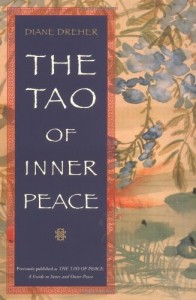By Diane Dreher. 1990, 2000.
Tao people take risks. They learn by doing. Te means living with commitment, realizing that life is continuous change, that even failures bring us closer to the truth.
The Chinese character for wisdom, hui, shows a broom held over the mind-heart. For the Chinese, wisdom literally means sweeping away clutter. We can do this in four different ways: by simplifying our possessions, our knowledge, our communication, and our use of time.
The Tao Te Ching teaches openmindedness, freedom from the tyranny of custom and authority. Much of what passes in the world for knowledge is intellectual clutter that keep us from thinking for ourselves.
We achieve the joy of Tao by returning to our original nature, affirming p’u, which means literally “the uncarved block,” natural wood without carving or embellishment. Those who achieve p’u are without pretense; therefore, they do not fear exposure or ridicule. Knowing who they are, they are unaffected by flattery or criticism.
The way of Tao combines discipline and adventure. One person who epitomizes these is Robert William Smith, Ph.D., former professional football coach, now a philosophy professor at Mesa College in Arizona.
A tall, vigorous man in his early sixties, Robert travels the world, writing books on Eastern philosophy, and living with a zest that makes each day an adventure.
In his life and work, he combines the discipline of coaching, the wisdom of the East, and his own hearty enthusiasm. He begins each course by asking students to “give a positive response to life,” which means “learning to spend your days in the proper way.”
“Get up early,” he tells them, and “greet the day” with a blessing, a song, a chant, a prayer. Make each day your own.
We’re each composed of spirit, mind, and body, he explains, and they all need daily stimulation. For the body, stimulation means exercise. … For the mind, Robert recommends “creative daydreaming” to stimulate your imagination. For the spirit, he advises, think empowering thoughts, read inspiring works, and attend to what you’re doing.
Many mistakes are made when people ignore this lesson. In the 1950s the World Health Organization tried to eliminate malaria in northern Borneo by using the pesticide dieldrin to kill mosquitoes carrying the disease. Initially, the project seemed a great success. Not only did the mosquitoes and malaria disappear, but villagers were no longer bothered by flies and cockroaches. But then their roofs began to fall in on them and they faced the threat of a typhus epidemic.
How did this happen? First, hundreds of lizards died from eating the poisoned insects. Then the local cats died from eating the lizards. Without the cats, rats ran rampant through the villages, carrying typhus-infected fleas on their bodies. To add insult to injury, the villagers’ thatched roofs were collapsing. Why? The dieldrin killed wasps and other insects that ordinarily ate the caterpillars that fed on the thatched roofs. The Tao Te Ching teachers that everything in life is interconnected, a lesson the World Health workers were forced to acknowledge in Borneo. After staving off the typhus threat, they began to consider the larger implications of their actions.
American naturalist John Muir was a Tao person in the highest sense. Wandering the mountains of the west, he concluded that “Pollution, defilement, squalor are words that never would have been created had man lived conformly to nature.” Non-Tao people are often shortsighted. They pollute and destroy life because they don’t see the larger patterns.
How aware are you of the natural cycles around you?
- When is the next solstice? Equinox?
- What phase is the moon in now?
- What changes do the plants in your area go through during the different seasons of the year?
- Do any birds in your area migrate? If so, which ones and when?
- Do any animals in your area hibernate? If so, which ones and for how long?
For centuries, Taoist and Buddhist monks have regarded cyclical work—gardening, cooking, housecleaning—as spiritual exercises. In our daily lives we too can participate in the cycles of renewal by doing something cyclical.

